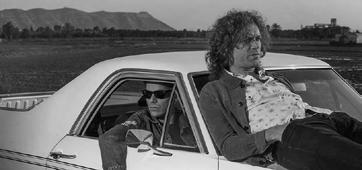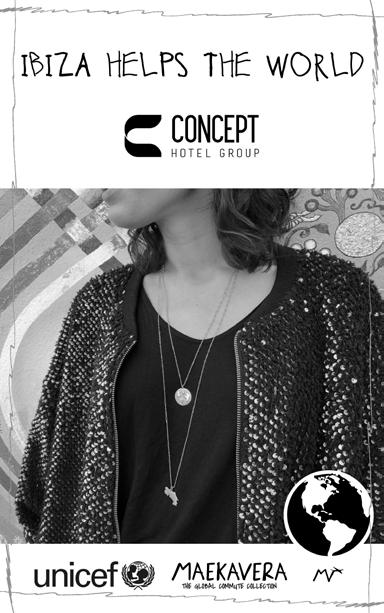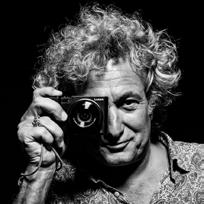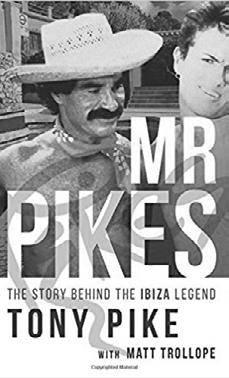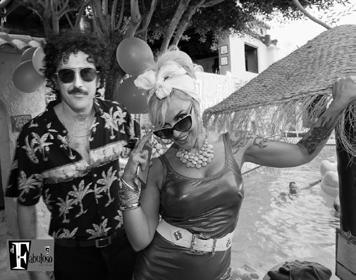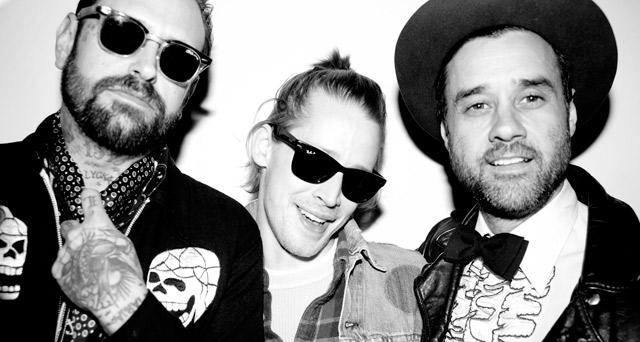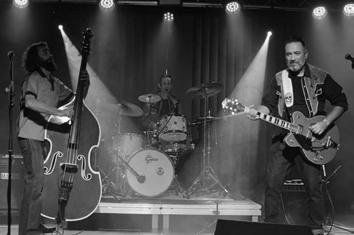
16 minute read
Harvey
1. Encantado de conocerte, cuando yo era un joven de 20 años en Londres durante los años 90, tu nombre era omnipresente en toda la escena electrónica londinense. Luego te fuiste a Hawái y te quedaste más de 10 años. Cuando pienso en Hawái, me vienen a la cabeza los estereotipos habituales: pienso en Magnum PI, Hawái 5-0 (el programa original), Aloha, chicas con flores en el pelo, es como decir que los británicos simplemente comen pescado y patatas fritas y se emborrachan cuando están en el extranjero?
Interview by Colin Peters
Advertisement
Hasta cierto punto, sí, los estereotipos están ahí; cuando llegas te dan la bienvenida con el “lei”. Que es un collar, una guirnalda de flores autóctonas. La gente se pone las flores detrás de las orejas, en el lado izquierdo si tienes novi@ y en el derecho si no. Es un lugar muy musical donde encuentras cosas como la guitarra hawaiana de slack key, y donde las mujeres usan los vestidos típicos hawaianos (mu mu´s) y la gente come lau lau, hay mucho de la cultura hawaiana estereotipada que todavía está viva y en buena forma, pero al mismo tiempo es muy moderna y actual con respecto a todas las cosas que encontrarías en una ciudad estadounidense. ¡incluso con todas las cosas que viste en Hawái 5-0 o Magnum!
2. Mientras, en Hawai creaste un club y un programa de radio, The 39 Hotel, ¿era terreno fértil para crear algo nuevo y fresco allí?
Hawai siempre tuvo una cultura del entretenimiento, pero en lo que se refiere probablemente a la cultura hipster, fuimos uno de los primeros defensores de la música de baile progresiva. El espacio donde se llevó a cabo se describió como un espacio multimedia orientado a la comunidad y allí ocurrieron todo tipo de cosas: exposiciones de arte, fiestas, seminarios, proyecciones de películas ... Probablemente fuimos pioneros porque nos mudamos a un lugar llamado Hotel Street, de ahí el nombre The 39 Hotel. Nunca fue realmente un hotel, era solo un lugar, pero la gente solía llamar para reservar una habitación y teníamos que explicar que no era en realidad un hotel. Hotel Street en ese momento era un barrio chungo, muy deteriorado, al principio la gente decía: “oye, vamos a tu fiesta” y decíamos: “está en la calle del hotel”, y decían: “oh yo no bajo allí “. Han pasado 15 años y ahora está completamente aburguesado, con muebles bonitos, agradables cafés y restaurantes, etc. Pero definitivamente fuimos nosotros los que nos adelantamos al movimiento cultural moderno en ese aspecto.
3. Tus influencias musicales abarcan el acid house, los comienzos del hip-hop y la metamorfosis de la música disco hacia lo que hoy conocemos como música electrónica. En este éste periódico estamos particularmente interesados en tu época como baterista en una banda de punk rock de los 70, ¡cuéntenos más!
En lo que se refiere a la influencia del rock, mi primer contacto con la música fue la colección de discos de mi madre. Tenía una gran selección de rock n roll original de los 50 como Elvis, Buddy Holly, Jerry Lee Lewis, Bill Haley y The Comets, Johnny Cash. Lo primero que me gustó personalmente fue la psicodelia tradicional basada en el blues, como Jimmy Hendrix, Cream, Deep Purple, etc. Luego vino el punk rock y, en muchos aspectos, estaba más con la actitud que con la música. Si viste a Hendrix aplastar una guitarra o a Keith Moon rompiendo una batería, eso era una actitud punk, esos tipos sabían tocar. Mi banda favorita de punk era The Damned. Lemmy de Motorhead tocaba con Hawkwind y durante un tiempo con The Damned, asi que seguí a Motorhead por el Reino Unido en el Bomber Tour, fue muy divertido hacer autostop. Había una banda llamada Eater que tenía un niño como batería, creo que tenía 11 años, era genial tener a un crío baterista, y yo también lo era. Iba a los pubs, con las novias de los otros miembros de la banda rellenando zumo de naranja con vodka para darme un poco de coraje. Todo eso me marcó a una edad muy temprana a llevar un estilo de vida rock ‘n’ roll. Era cuando las chicas querían parecerse a Cher y los chicos a Keith Richards o a David Bowie, eran buenos tiempos. La gente no se da cuenta de cuán cerca están del punk, del hip hop y del reggae, los punks y los rastas se consideraban marginados, así que salimos juntos y esa fue mi introducción al dub reggae, The Clash trajo al artista de graffiti Futura a Londres a principios de los 80 y los conectó al hip hop, donde también había bandas como Blondie haciendo discos de rap. Encuentro que las categorías solo son útiles para periodistas, para ser honesto, solo hay 2 tipos de música, country y western. He estado metido en esto durante mucho tiempo y lo nuevo que llega me interesa. Volviendo a 1975/1976, el punk fue el nuevo movimiento. de graffiti Futura a Londres a principios de los 80 y los conectó al hip hop, donde también había bandas como Blondie haciendo discos de rap. Encuentro que las categorías solo son útiles para periodistas, para ser honesto, solo hay 2 tipos de música, country y western. He estado metido en esto durante mucho tiempo y lo nuevo que llega me interesa. Volviendo a 1975/1976,
4. Teniendo esta variedad de influencias, ¿dirías que se reflejan en tus sesiones de Dj?
Hasta cierto punto… no me gustaría ser considerado DJ de disco, DJ de música house o un DJ de techno, soy un DJ de personalidad, cuando pincho, entrego mi personalidad y trato de ofrecer lo que considero que es la mejor música para ese momento, pincho para la multitud y trato de mantener a la mayoría de la gente entretenida cuando pincho.
5. Volviendo a Hawái, en el periódico Rock Nights, somos muy aficionados a coleccionar camisas hawaianas y de bowling, como un tipo que viste bien, coleccionabas también algunas piezas?
Lo creas o no Hawai no es el mejor lugar para comprar camisas hawaianas, Camden Lock en Londres lo es! ¡Los mejores bares de Tiki del mundo están en Texas! Cuanto más lejos te encuentres de Hawai, las cosas tienden a ser más “Tiki”. Una de las marcas de ropa más underground es Iolani Beach Wear, no tanto por las camisas Aloha, ya que son casi más estilo safari. Tienen algunas cosas interesantes y me gusta coleccionarlas.
6. Cuando pensamos en Hawai, también pensamos en el surf, ¿te aficionaste?
Siempre hacía skateboard cuando era un niño en los años 70, tenía una tía que vivía en California y mi abuela siempre me traía patinetes cuando iba a visitar a mi tía! Siempre he sido un aficionado de California y de E.E.U.U, y muchas de las cosas que me gustan son de esa parte del mundo. Cuando me mudé a Hawai pasé mucho tiempo en el agua aprendiendo a surfear, y acabo de regresar de Bali, donde pasé 2 semanas navegando antes de pinchar en el Vice Weekender. Me encanta el surf, me da mucho equilibrio en mi vida, especialmente porque paso mucho tiempo en los clubes nocturnos y en los estudios, así que sentarme sobre el océano y montar sobre las olas cósmicas del sol es algo muy especial.
7. ¿Cómo estuvo el Vice Weekender?
Súper, alocado, muy divertido, buenos momentos en general, jugando en el Potato Head Beach Club en Bali y pasando un par de semanas navegando en Uluwatu y Chengdu, para cualquiera que haga surf reconocerá esos nombres. Bali tiene buenas olas durante todo el año, mientras que en Hawai, las grandes olas vienen en el invierno y en California en el verano.
8. Creo que compartimos la misma aversión de ir a Ibiza al principio y luego enamorarnos de ella cuando finalmente llegamos. Has tenido un gran impacto en la escena de Ibiza a tu regreso con sesiones regulares en Amnesia, Space y tu residencia en Pikes. ¿Esperabas que tu sonido fuera tan popular, especialmente en los clubes más grandes?
Pincho para el público, la gente dice: “eres muy afortunado de poder hacer lo que quieres”, pero eso no es verdad, pincho lo que la gente quiere, es posible que no sepan que eso es lo que quieren, pero es eso lo que quieren. Desde Hostal La Torre hasta Pikes o Pacha, me adapto a la situación, obtienen mi personaje en la música, disfruto la melodía y la pasión. No tiene que ser un género, no llevo un concepto preconcebido de lo popular que puede ser o no y felizmente la gente ha subido a bordo, especialmente en Pikes, que se ha convertido en mi residencia de verano emblemática y es absolutamente fantástico.
9. Tus sets son, digamos, a prueba de Shazam, ¿crees que es importante que los DJs reserven una cierta mística?
Un poco, hay algunos discos que me llevan tiempo encontrar, recabar y ofrecer a la gente, no soy demasiado reservado con esto. Me hace sonreír cuando veo a una persona bañada en esa luz azul y luego la frustración en su cara, porque en realidad deberían haber estado bailando en lugar de estar buscando el tema, y luego subir y preguntarme qué era. Deberían ser un poco más pacientes y disfrutar el momento. ¡Si me preguntan, vale. Seguramente les diré q era.
10. Si no fueras un DJ y productor con personalidad, ¿qué habrías hecho?
Probablemente estaría saludando a la gente en Sainsbury’s, (Mercadona para un español) no estoy cualificado para hacer otra cosa que no sea ser un artista. Cuando estaba en la escuela me preguntaban: “Harvey, ¿qué quieres hacer cuando seas mayor? y yo decía que quería ser batería en una banda de rock ‘n’ roll, uno de esos chicos geniales que andan por Soho, de los que parecen que no hacen nada en todo el día. ¡Gracias a Dios que funcionó para mí! Pero en aquellos momentos decían: “esa no es una opción, tendrás que unirte a la Fuerza Aérea o trabajar en una fábrica de salchichas o algo así”. Hice algunos trabajos de mierda antes de convertirme en DJ profesional, así que estaría encantado de saludar a la gente en Sainsbury’s o de reponer en Blockbuster, y pasar el fin de semana tocando en una banda de tributo a Cream. ¡Mientras paguen la renta y puedan reírse el fin de semana, estaría feliz!

1. Please to make your acquaintance, as a young 20 something in London during the 90s your name was ubiquitous across the London dance scene. Then you went to Hawaii and stayed for more than 10 years. When I think of Hawaii the usual stereotypes come to mind: think of Magnum P.I, Hawaii 5-0 (the original show), Aloha, girls with flowers in their hair, is this like saying that British people just eat fish and chips and get very drunk when abroad?
To a certain extent yes, the stereotypes are there; when you arrive if you’re lucky you get “leid”. Which is a flower lei, a garland made of indigenous flowers. People wear flowers behind their ears, on the left-hand side if you have a partner and on the right if not. It’s a very musical place with things liken the Hawaiian slack key guitar, and where ladies wear mu mu’s and people eat lau lau’s. There’s so much of the stereotypical Hawaiian culture that is still alive and well, but at the same time it is very modern and up to date with all the things that you would find in an American city, along with all the things you’d see on Hawaii 5-0 or Magnum!
2. While in Hawaii you created a club and radio show, The 39 Hotel, was it fertile ground to create something new and fresh there?
Hawaii’s always had an entertainment culture but as far as what’s probably thought of as hipster culture, we were one of the first advocates for progressive dance music. The space where it was held was described as a communityoriented multimedia space and all kinds of things happened there: art shows, parties, seminars, film shows… we were probably groundbreaking because we moved into a place called Hotel Street, hence the name The 39 Hotel. It was never actually a hotel, it was just a venue, but people would often call to reserve a room and we would have to explain that it wasn’t actually a hotel! Hotel Street at that time was a dodgy area, very “cracked” out, at first people would say “hey we’re coming to your party” and we would say “it’s in Hotel Street” and they’d say “ooh I’m not coming down there”. Fast forward 15 years and it’s now completely gentrified with soft furnishings, nice cafes and restaurants etc. but we were definitely the pioneers of modern cultural entertainment in that area
3. Your musical influences cover acid house, the beginnings of hip-hop and the metamorphosis of disco into what we know today as electronic music. For this newspaper we are particularly interested in your time as a drummer in a punk rock band in the 70s, tell us more!
As far as the rock influence is concerned the first music that I got into was my mum’s record collection, she had a great collection of original rock n roll from the 50s like Elvis, Buddy Holly, Jerry Lee Lewis, Bill Haley and The Comets, Johnny Cash. The first music I liked on my own was blues based traditional psych like Jimmy Hendrix, Cream, Deep Purple etc., then punk rock came along and in many respects I was more into the attitude than the music. If you watched Hendrix smash up a guitar or Keith Moon smash up a drum kit, it was a punk attitude, but those guys could actually play. My fave punk band was The Damned. Lemmy from Motorhead, who also played for Hawkwind, also played for The Damned a little while, I followed Motorhead around the UK on the Bomber Tour, that was a lot of fun hitchhiking around. There was a band called Eater who had a baby drummer I think he was 11 years old, it was hip to have a baby drummer, and I was a baby drummer as well! I was going to pubs, with the girlfriends of the older band members topping up my orange juice with vodka to give me a bit of Dutch courage. This instilled the rock ‘n’ roll lifestyle from a very young age, at a time when girls wanted to look like Cher and boys wanted to look like Keith Richards or David Bowie, cool times.
People don’t realize how close punk, hip hop and reggae are, the punks and the rastas were considered outcasts so we hung out together and that was my introduction to dub reggae, The Clash brought graffiti artist Futura to London in the early 80s and that connected me to hip hop, where you also had bands like Blondie making rap records.
I find that categories are only useful for journalists, to be honest there are only 2 kinds of music, country and western. I’ve been into this for a long time and whatever new comes along I’m interested in. Back in 1975 / 1976 punk was the new movement.
4. Having these different types of influences, would you say they are reflected in your DJ sets?
To a certain extent, I wouldn’t like to be considered as a disco DJ or a house DJ or a techno DJ, I’m a personality DJ, when I DJ you get my personality and I try and play whatever I think is the best music for that moment, I play to the crowd and try to keep the majority of the people entertained when I play. underground clothing labels is Iolani Beach Wear, not so much Aloha shirts, it’s almost like safari wear. They have some cool stuff and I like to collect those.
6. When we think of Hawaii we also think of surf, did you indulge?
I always skateboarded as a kid in the 70s, I had an aunt who lived in California and my grandmother would always bring me back skateboards when she went to visit my auntie, I’d always have the hot ride! I’ve always been a Californiaphile and an Americophile and a lot of stuff I’m into is from that part of the world. When I moved to Hawaii I spent a lot of time in the water learning how to surf, and I’ve just got back from Bali where I spent 2 weeks surfing before DJing at the Vice Weekender there. I love surfing it puts a lot of balance in my life, especially because I spend a lot of time in nightclubs and studios, so to sit in the ocean and ride the cosmic waves of the sun is a very special thing indeed.
7. How was the Vice Weekender?
Super, messy, a lot of fun, good times all round, playing at the Potato Head Beach Club in Bali and hanging out for a couple weeks surfing beforehand in Uluwatu and Chengdu, for anyone who surfs they will recognize those names. Bali has good surf all year round whereas in Hawaii the big surf comes in the winter and in California it comes in the summer.
8. I think we shared the same aversion of going to Ibiza at first and then falling in love with it when we finally arrived. You’ve made a huge impact on the Ibiza scene on your return with regular sets in Amnesia, Space and your residency at Pikes. Did you expect your sound would be so popular, especially in the bigger clubs?
I play to the crowd, people say “you’re so lucky you get to play whatever you want”, but that’s not true, I play what the people want, they may not know that’s what they want, but it is what they want. From Hostal La Torre to Pikes or Pacha, I adapt to the situation, you get my character in the music, I enjoy melody and passion in the music. It doesn’t have to be one genre, I had no preconceived concept as to how popular it may or may not be and happily people have come on board, especially at Pikes, which has become my flagship summer residency and its absolutely fantastic.
9. Your sets are shall we say Shazam proof, do you think it is important for DJs to retain a certain mystique?
A little bit, there are some records I take time to find and dig out and present them to the people, I’m not overly precious about the information. It does make me smile when I see a person bathed in that blue light and then the frustration on their face, because really they should have been dancing to the damn thing and then come up and ask me what it was. They should be a little more patient and actually enjoy the moment. If they ask me nicely I’ll be sure to tell them!
10. If you weren’t a personality DJ and producer, what would you have done?
I would probably be greeting people at Sainsbury’s, I’m completely unqualified to do anything else but be an entertainer. When I was at school they would ask me “Harvey what do you want to do when you grow up and I’d say I want to be a drummer in a rock ‘n’ roll band, one of those cool kids that hang around Soho all day looking like they don’t do anything. Thank god it worked out for me! But back in those days they were like “that’s not an option, you’ll have to join the air force or work in a sausage factory or something like that. I did do some crappy jobs before I managed to turn pro DJ, so I’d be happy to greet the people at Sainsbury’s or stacking shelves at Blockbuster, and at the weekend playing in a Cream tribute band. As long as your rent’s paid and you can have a laugh at the weekend I’d be happy with that!

